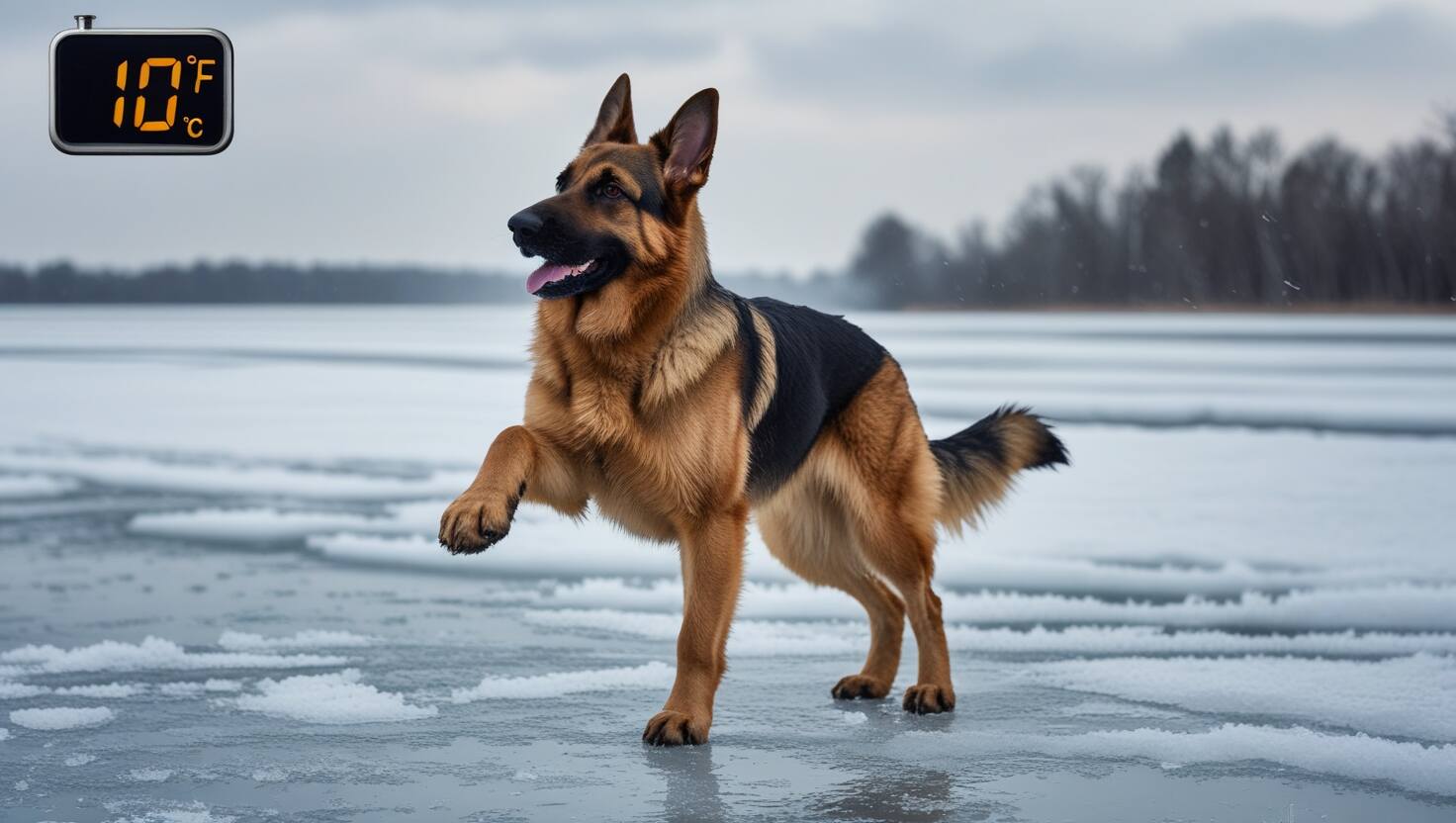Can a German Shepherd Sleep Outside in the Cold?
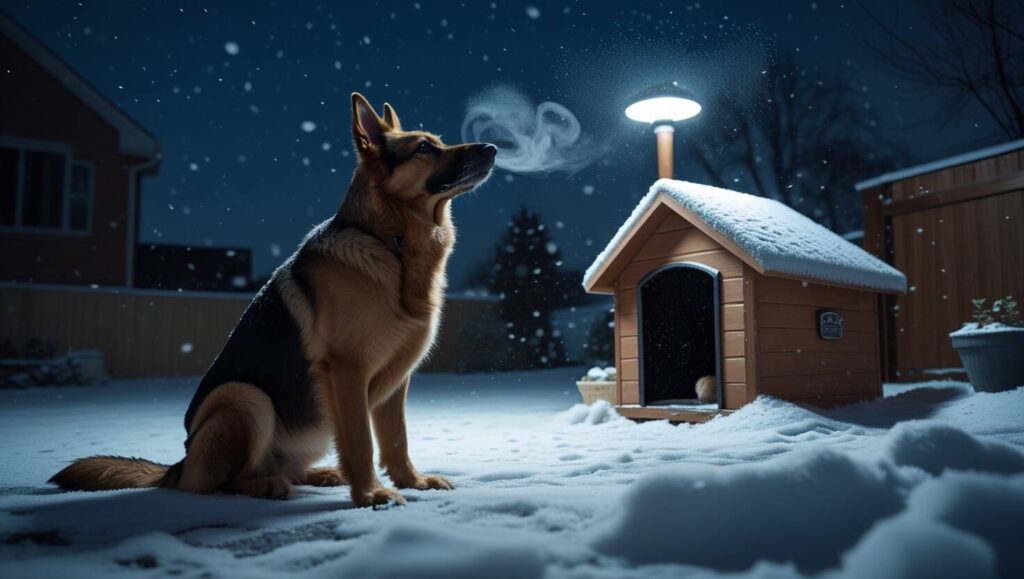
No, German Shepherds should not sleep outside in extreme cold. While they have a double-layer coat that provides insulation, they are not naturally built for freezing temperatures. Exposure to 0-45°F (-18 to 7°C) for too long can lead to hypothermia, frostbite, and health issues. Puppies, seniors, and short-haired GSDs are at even higher risk.
Understanding Their Ability to Handle Cold Weather
German Shepherds are strong and versatile dogs that can handle different climates, thanks to their double-coated fur. While they have some cold-weather living abilities, their tolerance depends on various factors, including their coat types, fur density, and metabolism. Unlike breeds such as the Siberian Husky or Alaskan Malamute, German Shepherds are not naturally built for extreme cold weather.
Thick Double Coats
A GSD’s double coat helps protect them from cold winds, rain, and freezing conditions. The outer coat repels moisture, while the shorter inner coat provides insulation. However, this warm coat is not always enough in negative temperatures, especially during colder months.
Fur Density
Fur thickness varies between long-haired and short-haired German Shepherds. Those with thicker coats have a better ability to regulate temperature, while short-haired ones are more vulnerable. The fur density plays a key role in how well a GSD can tolerate cold climates.
Temperature Regulation Ability
German Shepherds have a natural ability to adjust to cooler areas, but they may still struggle in extreme temperatures. If exposed to cold weather for too long, they can develop health problems, such as shivering, lethargy, and refusing to move. Providing a cozy spot, warm blankets, and protection from the elements is essential.
Higher Metabolism
Compared to other dogs, German Shepherds have a higher metabolism, allowing them to generate heat in chillier air. However, this does not make them immune to the dangerous elements of freezing conditions. If a dog’s normal body temperature drops below 101 to 102.5 degrees Fahrenheit (38.3 to 39.2 degrees Celsius), immediate attention is needed.
Cold Climate Breeding History
Although German Shepherds were bred in Germany and adapted to various environments, they do not have the same cold climate breeding history as the Japanese Akita, Samoyed, or Chow Chow. While their versatility worldwide allows them to live in different regions, they need proper care in wintertime to remain happy and healthy.
Cold Weather Limits for German Shepherds
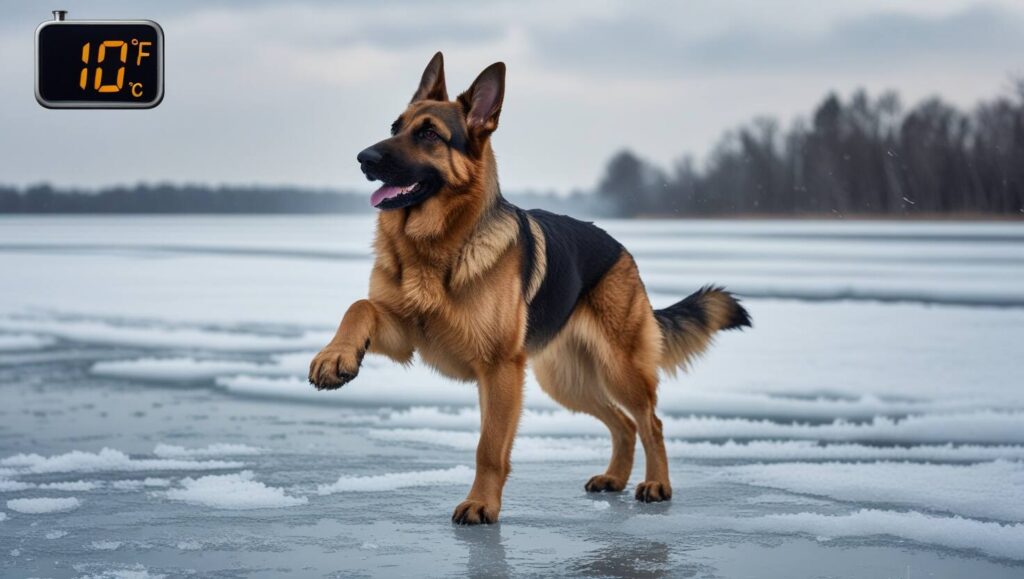
German Shepherds are large breeds with a thick double coat, but that doesn’t mean they can safely stay outdoors in extremely cold weather. When temperatures drop below 32°F (0°C), they start feeling discomfort. Adult German Shepherds can handle 32-50°F (0 to 10°C) for short periods, but anything below 0-45°F (-18 to 7°C) puts them at risk of hypothermia, frostbite, and other health issues.
During cold winters, extra care is needed. If a German Shepherd has to go outside, limit it to 10-15 minutes, multiple times per day. They need a warm shelter, fresh water, and winter coats or sweaters in bad weather, including heavy snow, strong winds, or freezing rains. Once the temperature rises above 50°F (10°C), they can play for longer periods.
Since German Shepherds are social, protective, and loyal family members, they do not do well as outside dogs. Training, socialization, and frequent human interaction are necessary, as isolating them can widely affect their temperament. They are physically strong, but they temperamentally belong in indoor environments, staying part of the family rather than living outside.
Risks of Sleeping Outside in the Cold
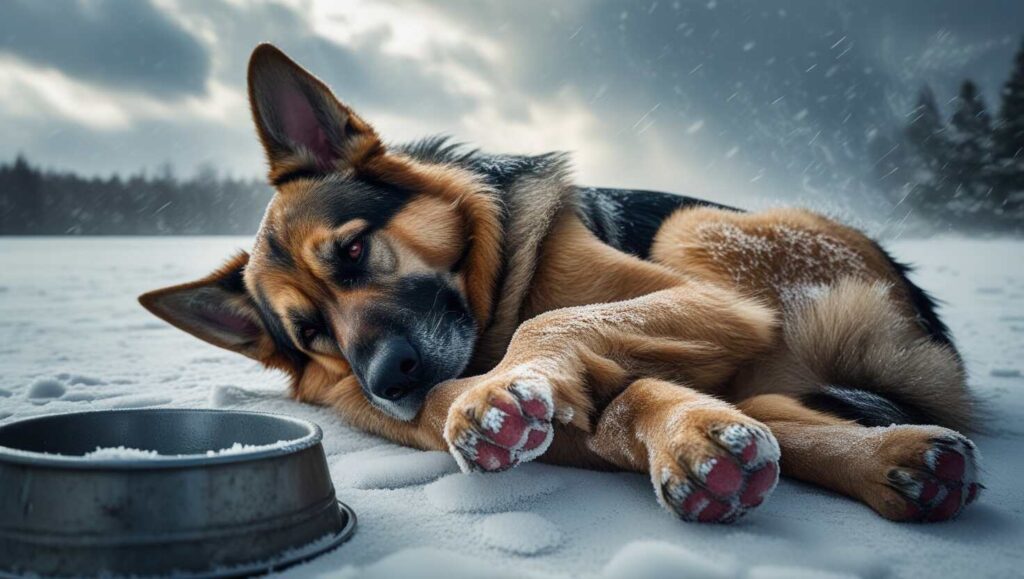
They Can’t Regulate Their Body Temperature
Even though German Shepherds have a double-coated thick fur, they struggle to regulate body temperature in harsh temperatures. Cold weather can cause them to lose heat quickly, while hot temperatures and humidity make it hard for them to cool down. Drafts and extreme conditions are dangerous, leading to unhealthy symptoms like lethargy or fainting.
Nighttime Is Vital for Crate Training
Proper crate training is important, especially at night. If a German Shepherd is left to sleep outside, they may develop anxiety instead of feeling secure. Large dogs also need a routine that keeps them close to their owners for comfort and discipline.
Puppies Are More Susceptible to Diseases
A puppy under six months is highly susceptible to diseases, germs, and parasites. Even if vaccinated, exposure to dirty environments can slow development and cause illness. They are also more at risk from poisonous plants, antifreeze, pesticides, and acid rain, which can be deadly.
German Shepherd Puppies Need Bonding Time
This breed is known for its loyalty and devotion to its family. Bonding time is important, and isolating them outside may cause behavioral issues. Companionship and engagement help them feel safe and mentally stimulated.
Weather
Extreme cold or hot temperatures can be hazardous to a German Shepherd’s health. Shedding increases in response to changing weather, and heat stroke is a real danger in humid environments.
Health
Leaving a German Shepherd outside exposes them to environmental dangers like leaking gas, salt melt, sharp objects, and fence injuries. Hygiene is also harder to maintain, increasing the risk of illness.
Behavior
Without stimulation and training, they may develop boredom, leading to barking that disturbs neighbors. German Shepherds are used by firefighters and police because they require physical and mental exercises to stay balanced. If left alone too often, they may struggle to adapt to indoor environments later.
Behavioral and Safety Risks
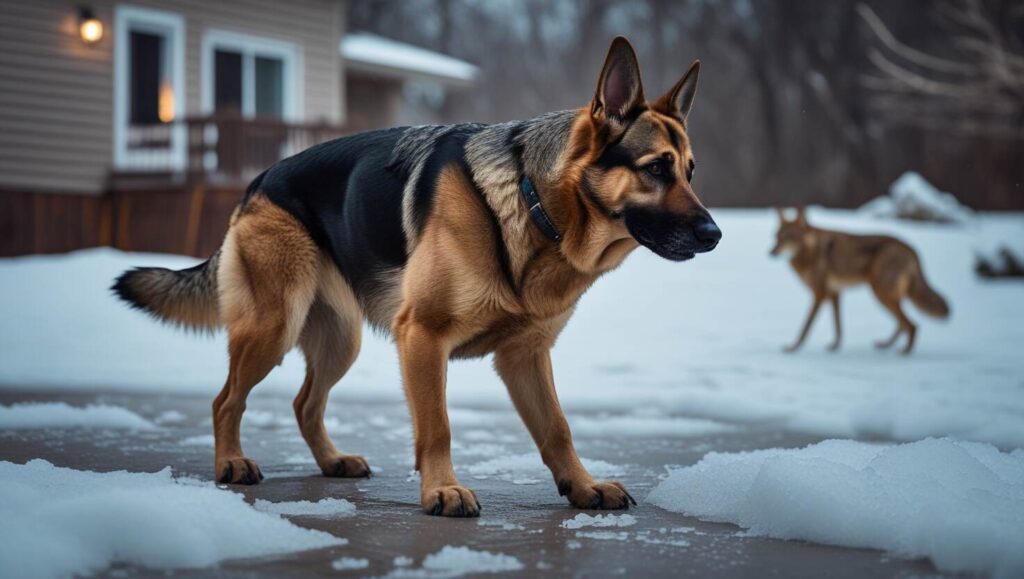
They Need to Bond with Their Family
German Shepherds are highly people-oriented and develop a strong bond with their family. If they sleep outside, they may feel isolated, which can affect their temperament. This breed thrives on interaction and prefers being involved in daily activities.
They Can Become Bored
Without enough mental stimulation and exercises, German Shepherds can get bored and act out. They need long walks, puzzle toys, and training to stay engaged. Otherwise, they may start digging, climbing, chewing on cabinets, or excessive barking.
German Shepherds Must Learn to Behave in the Home
Proper house training is important to help them adjust to indoors. Managing shedding and grooming can prevent excessive fur on furniture like the couch. House manners are key to having a well-behaved dog.
A Dog Left Outside Can’t Protect Your Home
Though German Shepherds naturally protect home from invaders, a dog left outside isn’t as effective. They need to be inside to recognize real threats, not just react to strangers walking by.
German Shepherds Need Lots of Socialization
Without proper socialization, they may become too cautious, even in everyday home settings. Exposure to doors closing, hallways, and new people helps them feel comfortable instead of seeing everything as a threat.
Protecting German Shepherds from Cold Weather
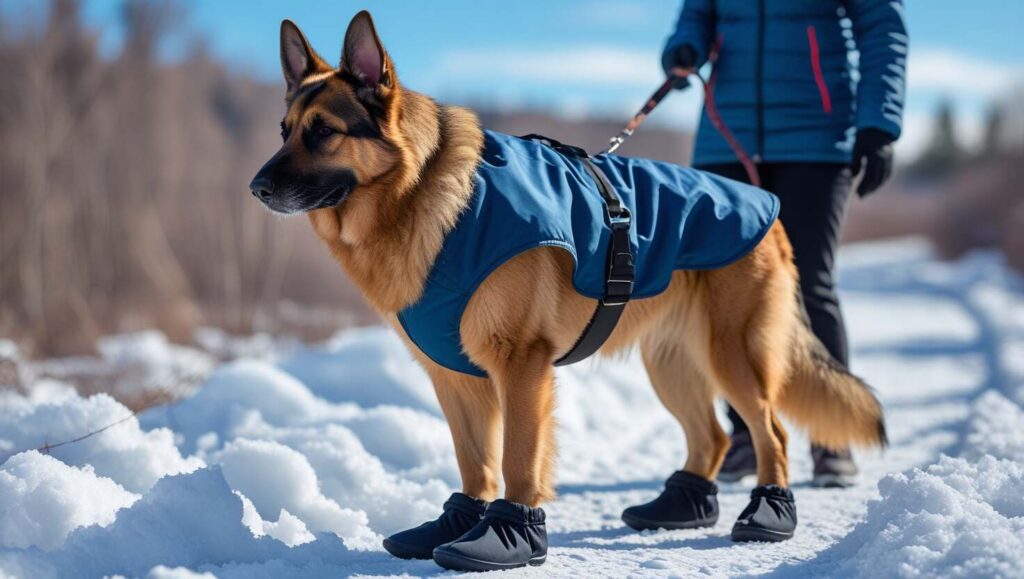
Keeping Your German Shepherd Safe and Warm
Make Sure Their Shelter Is Well-Insulated
A German Shepherd needs an insulated dog house to stay warm. The shelter should block wind, rain, and snow and provide full protection from extreme elements during winter.
Provide Extra Warmth With Soft Bedding
To keep them cozy, use blankets, cushions, and dog beds. Washable covers, pillows, and towels help maintain cleanliness while adding warmth.
Use Rubberized Flooring for Better Paw Protection
Cold ground can make their feet freeze. Rubberized flooring provides feet insulation, preventing direct contact with icy surfaces.
Keep Them Away From Drafts and Open Windows
Make sure their shelter is in a spot without drafts or open windows to keep them warm and comfortable.
Set Up a Warm, Enclosed Area With Towels and Pillows
A small enclosed space lined with pillows and towels helps trap heat and provides extra warmth in frigid conditions.
Give Them Access to Sunny Areas for Natural Warmth
Let them stay in sunny spots in the yard or near windows to naturally boost their body temperature.
Keep Your Dog Active to Maintain Body Heat
Daily exercise is essential to maintain their metabolism and keep their body temperature steady in cold weather.
Feed Them More in Cold Months for Extra Warmth
A well-fed German Shepherd will have better heat production. Extra dry, clean food helps fuel their double coats and keep them strong.
Keep Their Coat Dry and Well-Groomed
Avoid unnecessary bathing in winter to prevent stripping essential oils. Regular brushing helps maintain their fur insulation.
Limit Outdoor Time in Extremely Cold Weather
Even with proper gear like a winter coat, booties, and a safety LED collar, limit time outdoors to prevent exposure to snow, ice, and freezing winds.
Must-Have Winter Gear for Your German Shepherd
When temperatures drop, German Shepherds need extra protection to stay warm and safe, especially in cold climates. Their ability to tolerate the cold depends on factors like age, health, size, weight, coat quality, diet, genes, and parents. A dense, fluffy undercoat helps retain body temperature, but not all German Shepherds have the same level of insulation against winter winds, air temperature, and wind chill.
Invest in a High-Quality Winter Coat
A winter coat provides extra insulation, particularly for smaller, short-haired German Shepherds. It helps trap body heat and shields them from dampness, moisture, and icy winds. A well-fitted coat is crucial for wintery adventures and hikers exploring rough terrain with their pups.
Protect Their Paws With Booties
Dog boots are essential for keeping sensitive paws safe from ice, snow, salt, and hot surfaces. They also prevent injuries from hidden sharp objects in the snow. Ensuring they fit properly will keep your pup comfortable and protected.
Use Boot Socks for Extra Warmth
Pairing boot socks with booties adds extra feet insulation, keeping their paws moisturized and warm. This is particularly important for elderly German Shepherds or those with health concerns that make them more vulnerable to the cold.
Keep Them Cozy With a Sweater
A sweater provides additional warmth on cloudy days or for short outdoor trips. It’s especially beneficial for dogs with less insulation or those that feel the chill more due to smaller size, thinner coat, or health conditions.
Moisturize Their Paws With Paw Balm
Cold weather can lead to dry, cracked paws, so applying paw balm helps keep them moisturized and protected from rough terrain, snow, ice, and salt.
Improve Visibility With a Safety LED Collar
A safety LED collar is a must-have for wintery adventures when days are shorter and visibility is reduced. Whether walking on snowy trails or in urban areas, the bright light improves visibility, making it easier to track your German Shepherd in the dark or low-sun conditions.
By equipping your German Shepherd with the right clothing and protective gear, you’ll ensure they stay warm, safe, and comfortable all winter long!
Dangers of Extreme Cold on Your Dog’s Health
Hypothermia is a serious medical condition that occurs when a dog’s core temperature drops below 35°C (95°F). This can happen due to exposure to cold weather or cold water, especially in dogs left outside for too long. Factors like prolonged anesthesia, shock, or blood loss can also make a dog more vulnerable. Watch for symptoms such as shivering, trembling, lethargy, weakness, cool skin, bright red gums, pale appearance, and difficulty moving. If these signs appear, take immediate action by wrapping your dog in a warm, dry blanket and moving them to a heated space before seeking medical attention from a vet.
German Shepherds have strong paws, but thin skin on their feet makes them prone to ice burn when walking on icy surfaces. This can cause discomfort, injury, and even infections. Regularly inspect and clean their paws, and apply balm to soothe any cracks. When outside, take precautions like using hot water bottles or heating pads to keep their sleeping area warm. If left in the cold without protection, they can suffer severe health risks, requiring a proper treatment plan and careful transporting to a safe, warm place.
Activity and Care During Cold Weather
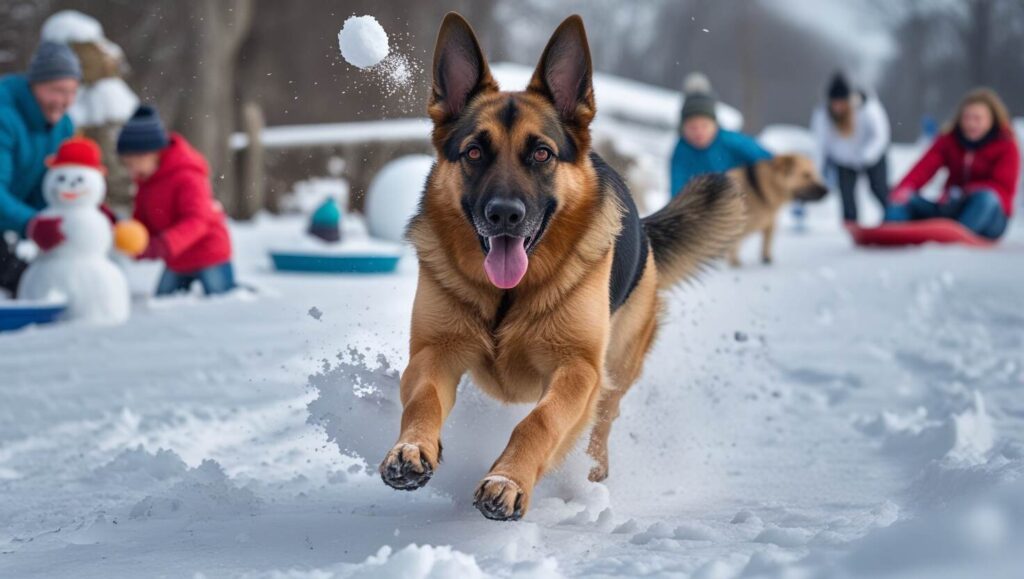
Outdoor Activities and Limitations
German Shepherds love outdoor activities, but in colder climates, it’s important to take precautions. When the temperature drops to 32-45°F (0 to 7°C), limit their time outside to a short time of about 20 minutes, especially if there’s a strong wind chill. Watch their behavior for signs of cold stress or discomfort, as extreme cold can impact their health. Keep them active and engaged with wintertime adventures like fetch, hide and seek, tracking, and sniff walks while avoiding temperature extremes.
For a high-energy dog, playing in the snow can be fun, but always monitor the duration and intensity of their exercise. Try exciting activities like scavenger hunts, snowball fights, sled pulling, follow the leader, or even snowman building to make the most of winter. A structured routine helps balance play and rest, preventing overexposure to low temperatures. Keeping your dog entertained in winter is great, but their safety should always come first.
Proper Diet and Coat Care for Winter
German Shepherds need the right nutrition in cold weather to maintain body heat and energy levels. A high-quality diet with protein-rich food helps them stay strong. Avoid overfeeding, as weight gain can lead to health problems rather than better warmth. Extra calories may be needed, but balance is key.
Good grooming improves insulation by keeping their coat healthy. Regular brushing removes dead fur and spreads natural oils, protecting their skin. Limit bathing in winter to maintain coat health and skin health. Proper care ensures they stay warm outdoors.
Keeping Your Dog Healthy and Prepared for Winter
German Shepherds can struggle in cold weather, especially if they have health conditions like arthritis. Owners should show vigilance by providing warm bedding to ensure comfort in freezing temperatures. Prolonged exposure to the cold may cause health issues, so regular veterinary check-ups are essential to keep them safe.
Proper training helps with adaptation to colder climates. Start with gradual exposure and create positive experiences in the snow using protective gear like coats and booties for warmth and protection. Avoid leaving them outside in extreme conditions to prevent serious health risks.
Where Should a German Shepherd Sleep?
German Shepherds are loyal, loving, and affectionate dogs that thrive best when sleeping indoors near their family. While they are strong, cold nights can be harsh, especially for puppies with small bladders and those still going through teething. Crate training from a young age helps them develop good behavior and provides a safe space while preventing destructive habits.
A well-trained dog enjoys being close to companionship, often resting near the front door, windows, or furniture. Their natural protection instincts make them alert, and they may bark if they sense anything unusual. Providing proper exercise, stimulation, playing, and running helps maintain a balance in their energy, making them friendly, non-aggressive, and obedient. A secure and comfortable sleeping area inside ensures they stay warm and feel appreciation from their owners.
Kindly note: The content shared in this blog is gathered from online sources, some of which may not be verified. For accurate guidance on caring for your dog, it is recommended to seek advice from a qualified veterinarian.
Frequently Asked Questions
How do German Shepherds handle cold weather?
German Shepherds have a double-layer coat that provides insulation, making them adaptable to cold climates. However, their tolerance depends on age, health, and coat condition. While they are somewhat cold-resistant, freezing temperatures can still pose risks like hypothermia and frostbite, especially for puppies, seniors, and dogs with thin coats.
What temperature is too cold for a German Shepherd?
While an adult German Shepherd can handle 0-45°F (-18 to 7°C), extreme cold below 20°F (-6°C) can be dangerous. Wind chill and wet conditions can reduce their comfort and cause health issues. Providing extra warmth with coats, sweaters, and warm bedding is essential during chilly nights.
Can a German Shepherd sleep outside in winter?
Sleeping outdoors in freezing temperatures is unsafe without proper shelter, insulation, and a heating source. Even with a warm coat, prolonged exposure to cold can lead to discomfort, joint problems, and behavioral issues. They should have an indoor space or a well-insulated designated area with blankets for security and warmth.
Are German Shepherds suitable for hot climates?
Although they are built for cold climates, German Shepherds can adapt to hot days with proper shade, fresh water, and air conditioning. In humid conditions, they may suffer from skin issues and overheating, so keeping them hydrated and limiting exercise during peak heat hours is essential.
Do German Shepherds need blankets at night?
Yes, even though they have a double-layer coat, a blanket adds extra warmth during cold nights, especially for puppies, seniors, or dogs in extremely cold areas. Warm bedding helps maintain their comfort and prevents frostbite or cracked pads from cold floors.
Why is my German Shepherd licking his paw after being in the snow?
Exposure to snow and ice can cause cracked pads and discomfort. Licking paws is a sign of irritation or pain from frostbite or exposure to salt and ice melt chemicals. Always wipe paws after walks and apply a balm to prevent skin issues.
Do German Shepherds like water?
Many German Shepherds enjoy swimming, especially in moderate temperatures. However, some may need training to feel comfortable in water. Always ensure safe conditions to prevent overexposure to cold or dehydration in hot weather.
Are German Shepherds indoor or outdoor dogs?
While they have the durability to stay outside for short periods, German Shepherds are best as indoor dogs due to their social nature, need for companionship, and love for family. They thrive with stimulation, training, and human interaction and should not be left alone outside for extended periods, especially in bad weather.

